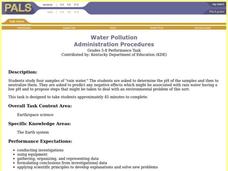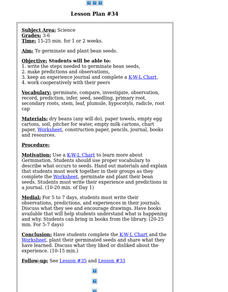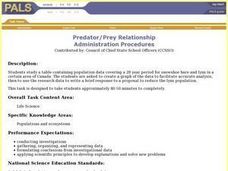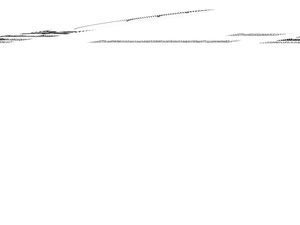Utah LessonPlans
Water Magicians
Students observe water changing states from a solid to a liquid to a gas.
Curated OER
Salad Party
Young scholars bring different plant parts in order to make one big salad. They observe each part and classify it.
Curated OER
Just Bee-Tween Flowers!
Learners examine the major plant and bee parts and the interdependency between bees and fast plants. They observe and record the stages of growth of fast plants, take photos of the plant's life cycle, and cross-pollinate plants.
Curated OER
Flowers, Pods, and Seeds
Students gain an understanding of living organisms. the complete a plant growth data log to chart plant growth and to make observations, predictions, and personal reflections.
Curated OER
Water Pollution
Students study four samples of "rain water". They asked to determine the pH of the samples and then to neutralize them. Students are asked to predict any negative effects which might be associated with water having a low pH and to...
Curated OER
From One Seed Grow Many Seeds
First graders practice identifying plants by singing a song. In this plant life instructional activity, 1st graders sing the song "Parts of a Plant" which is based on the anatomy of sunflowers. Students discover agriculture techniques...
Utah LessonPlans
Heavy Water
The relative weight of water, in different types of containers, is explored.
Utah LessonPlans
Water, Water Everywhere
Murals are used to represent the various ways we rely on water.
Curated OER
Germinate Bean Seeds
Students write the steps needed to germinate bean seeds, make predictions and observations and keep an experience journal and complete a chart.
Curated OER
A Fish in Water
Water is essential to all living things. This classroom experiment lets everyone observe goldfish and discuss what fish need to live, like food & clean water. They then listen to the book, Fish Out of Water, and compare the fictional...
Curated OER
Caverns: Drip Rate Analysis
Students tour a cave and collect water samples. They measure the drip rate from several locations inside the cave and discover the part water plays in cave formation.
Curated OER
Predator/Prey Relationship
Students study and analyze data collected on the relationship between the snowshoe hare and lynx in Canada over a 28 year period and create a graph. Students also write a response to a proposal to reduce the lynx population.
Curated OER
Earthworm Bridge
Fourth graders complete analysis experiments for decomposers and their adaptable traits. In this decomposers lesson, 4th graders test worm behavior to light, sound, warmth, touch, and moisture. Students work in groups to analyze the...
Curated OER
The Chemistry Connection
In this proteins worksheet, students read about the chemical compound, protein. Students determine where proteins are found in the body and how enzymes help the body react. Then students complete 3 short answer questions.
Curated OER
Earthquakes
Students observe the melting of ice. In this phase change lesson, students observe ice as it melts. They discuss the process and create a Venn diagram comparing water and ice.
Curated OER
Google Earth on the Range
Eighth graders use Google Earth to study the landscape of Utah. In this Utah landscape lesson, 8th graders view landscape photos and work in partners to analyze the pictures. Students write a paragraph that describes the landscape and...
Curated OER
Sounds of the Wetlands
Students identify the sounds of different bird calls. In this biology lesson, students create a sound map. They explain how this method is important in tracking wildlife.
Curated OER
Miniature Water Cycles
Students construct a model of the water cycle in action using two-liter pop bottles to build a terrarium. Locate examples of evaporation and condensation in the water cycle (e.g., water evaporates when heated and clouds or dew forms when...
Curated OER
Volcanoes:How Safe Are They?
Students explore volcanoes, locate them on maps, record general information about volcanoes, and organize information on a fact sheet.
Curated OER
Planting Phil's Garden
Learners study how to care for plants. For this plant care lesson, students observe a plant care demonstration and examine flowers using their senses. They listen to Janet Wakefield's, What If Everybody Gave? They complete a community...
Curated OER
Trees: Are They Thriving or Surviving?
In this trees survival lesson plan, 8th graders discuss what trees need to grow, brainstorm things that could adversely affect tree growth, and compare characteristics of thriving trees vs. surviving trees. Students learn about the trees...
Curated OER
Bioremediation
Students design and conduct investigations that illustrate the effect bioremediation has on organic matter and determine environmental applications. They, in groups, present their findings to the class.
Curated OER
Mission Era
Pupils examine the Mission Era. In this US History online lesson plan, students investigate daily life during the Mission Era as they participate in hands-on activities.
Curated OER
Biotic Factors
Students identify individual organism, a species, and a population within the study community. They identify biotic factors at the site and attempt to characterize the site's species diversity.

























